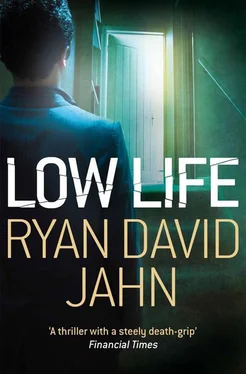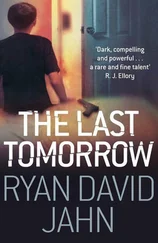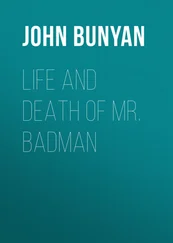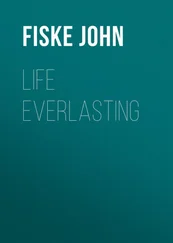Simon walked through this, and then pushed his way out of the fingerprinted glass doors and onto Wilshire Boulevard, where the Filboyd Apartments stood, one of the city’s many growths, rising twelve storeys into Los Angeles’s sun-bleached sky, rectangular and utilitarian as a barrack, a rusted fire escape etching a crooked spine down its back. Immediately the sounds and smells of the city accosted him – diner food and exhaust fumes, car horns and helicopters.
Half a block away, a bum was sleeping on a bench in front of a restaurant called Captain Bligh’s (which sold an impossible-to-finish one-pound Bounty Burger). Traffic flowed like a steel river along Wilshire, dammed at various intersections and slowed to a trickle here and there. Across the traffic-filled street, a low strip of buildings – an electronics store, a laundromat, a Korean barbecue place.
Simon turned right on the sidewalk and started west on Wilshire to find his car. He was about halfway there when he saw the dog. It was a mangy thing with reddish-brown fur and a left ear that looked like a piece of steak fat that had been chewed on a while. Its fur was matted with blood and filth. Its right eye was pure white with blindness but for a red vein bulging in one corner.
Simon paused mid-stride.
He looked at the dog and the dog, which had simply been limping along to who knew where, stopped and looked back. Its good eye was bright and alive and sad all at once. Something about the thing broke Simon’s heart. He sat on his haunches and set his lunch bag between his feet. He opened the top and dug inside, pulling out one of the liverwurst sandwiches from beneath pickle spears which were already leaking through their wrappers. He peeled the sandwich and held it out to the dog.
‘Come here, boy.’
The mutt cocked its head to the left, looking at Simon.
‘Come on, it’s liverwurst.’
The mutt took a few hesitant steps toward him, walking sidewise, as if afraid of coming at him straight, its yellow nails clicking against the pavement. Once it was within about a foot of Simon’s outstretched arm, it stopped and looked over its shoulder, guilt in its eye, afraid it was doing something that would earn it a swift kick from some unseen punisher. Then it stretched its neck toward the sandwich, grabbed it in its jaw, and scampered several feet away before dropping it to the sidewalk and eating it in a few quick bites.
‘That was nice of you.’ A thin, reedy voice.
Simon stood up – a brief dizziness swimming over him, black dots dancing before his eyes – and turned around to see an old man – at least ninety, maybe older – whose faced was lined with wrinkles, who had parentheses stacked up on either side of his mouth. Loose skin sagged from his neck and the bags under his eyes looked capable of holding a pint apiece. His lips were colorless. He wore a moth-eaten yellow cardigan and a pair of well-ironed – though threadbare – slacks and polished leather shoes that he’d probably owned since leaving Germany in 1956, or whenever it had been. The accent was thin but still easily detectable. He looked at Simon with eyes that were pale blue and raw.
Simon said, ‘Thank you,’ and then broke eye contact.
The old man nodded but didn’t move and didn’t speak. His gaze was steady.
Simon felt as if the old man expected something from him.
‘I have to get to work.’
The old man nodded again but remained silent.
‘Okay,’ Simon said. ‘Have a good day.’
He turned around and walked away. He glanced over his shoulder once before reaching his old Volvo, and then got into it, made an illegal u-turn – quickly, while traffic was blocked on either side by red lights – and drove toward downtown, where a pack of buildings jutted from the horizon like crooked teeth.
He spent his morning crunching numbers. He worked for a large payroll company that occupied the twentieth floor of a building whose main purpose seemed to be blotting out the sun. He sat in his black chair at his brown desk inside his gray cubicle and punched away at the number pad on his white keyboard.
When lunchtime arrived he got up from his desk, grabbed his lunch bag from the office fridge – which stunk of the rotten food that had gotten pushed to the back – walked down the hallway to the elevator, and waited. The building was fifty storeys tall and had an elevator for every ten-floor section, one through ten, eleven through twenty, twenty-one through thirty, and so on, each one stopping at the lobby level for pick-up and drop-off. The elevator came and went and the people standing with him got onto it and went away – and he continued to wait. After several minutes an empty elevator arrived and there was no one left waiting but him. He stepped onto it, knowing he was foolish to wait for the solitude of an empty elevator when it would certainly be full by the time he reached the lobby, but having to do it anyway.
The elevator stopped on the seventeenth floor and picked up two women.
He turned to the brushed-steel corner of the elevator and closed his eyes. They stung and he pinched them tighter. His chest felt cramped somehow. He tilted his head up toward the fluorescent lights in the ceiling and the black cover of his eyelids went red.
‘…and then Vince says, “What do I care who you sleep with?”’
‘Unbelievable.’
‘I know, right?’
‘What did you do?’
‘I told him I slept with his brother.’
‘Did you?’
‘No. Vince’s brother smells like a dumpster. I just wanted to see how he’d react.’
‘And?’
On the fifteenth floor several others joined the party – and on the twelfth and eleventh.
By the time he reached the lobby Simon felt sweaty and hot and slightly sick; the elevator was packed with people.
He rushed out of it, pushing past several slowpokes – hearing a ‘Hey, buddy’ and an ‘Asshole’ as he did so – and swiftly made his way through the marble-floored lobby to the non-recycled air and daylight of the outside world. He was breathing hard. He felt stupid for panicking over a crowded elevator, but he didn’t know how not to panic over it. Yet twenty floors was a lot of walking. So he simply took the elevator and felt sick four times a day – once in the morning; twice at lunchtime, once down and once up; and once when the day was over.
He blinked in the noontime light, his pupils shrinking to pinpoints. Robert and Chris were both standing in front of the building, smoking cigarettes.
Robert was tall and thin, wore suits that hung on his bony body like trash bags, and had a ponytail hanging off the back of his head that looked like a horse’s tail. He had a weak chin and a large forehead, which in an earlier age might have marked him as some sort of degenerate, and surprisingly small and delicate hands for a man his height.
Chris was about five three, a stringy little Texan with teeth like rotting fence posts and thin blond hair combed straight down onto his forehead. His face seemed somehow too large for the head it had been slapped onto, big eyes like a lemur, and a wide fish mouth. The muscles behind the flesh often twitched for no apparent reason, especially when he got on a rant, which was frequently.
Simon had no idea how old either of them was – maybe thirty-five, maybe forty.
Robert looked at his watch. ‘You finally give up and start taking the stairs?’
Simon smiled a smile that felt forced and false. His eyes felt dull in his head.
Even though he considered Robert and Chris his friends – his only friends, really – he did not know how to react to them. He felt lost in the world of human interaction. He thought that after thirty-four years of life he sometimes knew what was expected of him in social situations – he had learned the correct reactions through trial and error – but it never felt natural. It felt like a performance. He was supposed to smile so he smiled. He was supposed to laugh at a joke so he laughed. He was supposed to talk to his friends about television programs so he watched television in order to have something to talk about. But he felt apart from it – separated from it by some invisible membrane, stuck outside even himself, in some no-place, watching himself interact with the world from a distance – unable to join in, even while he appeared to be doing so.
Читать дальше












